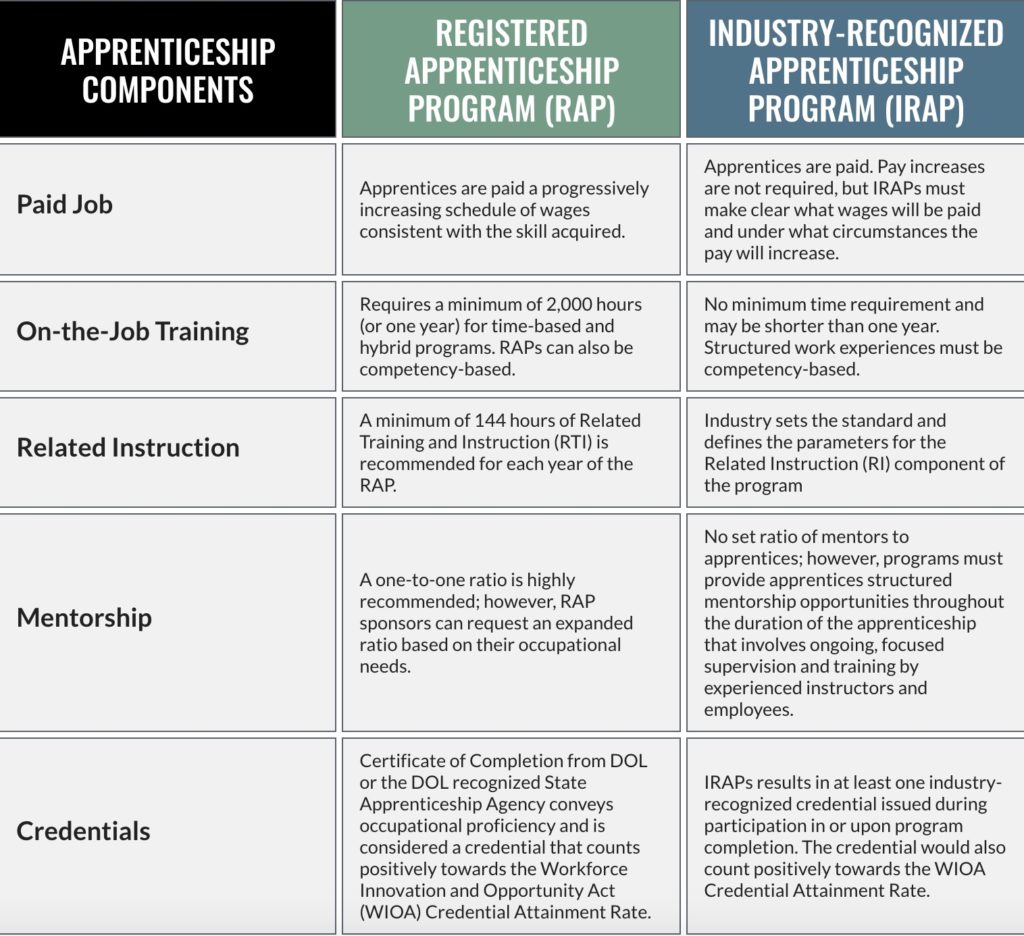Apprenticeships. You have been putting them off. Yes, they sound like the answer to your skills gap problem. Yes, they probably would help your organization with retention and productivity and all sorts of other benefits.
What has been holding you back? All of that paperwork. All of that bureaucracy.
The Department of Labor heard you. Last month, it published a final rule introducing a second, reportedly more user-friendly apprenticeship pathway: Industry-Recognized Apprenticeship Programs (IRAPs).
What Is an Industry-Recognized Apprenticeship?
Industry-Recognized Apprenticeship Programs are “high-quality apprenticeship programs that provide individuals with opportunities to obtain workplace-relevant knowledge and progressively advancing skills,” according to a fact sheet on Apprenticeship.gov. They contain all of the same components as the successful and long-standing Registered Apprenticeship Program (RAP):
- Paid work
- Written training plan
- On-the-Job Training
- Adherence to safety and Equal Employment Opportunity laws
- Related Instruction
- Mentorship
- Industry-recognized credentials
Any industry is eligible to develop an IRAP except for construction, since registered apprenticeships are already widespread in that sector.
Benefits of Industry-Recognized Apprenticeships
The Department of Labor is promoting “flexibility” as one of the key benefits of Industry-Recognized Apprenticeships. For example, unlike RAPs, IRAPs do not require a set number of hours for on-the-job training or related instruction. Rather, the industry sets the standard for those components based on its needs.
View a complete RAP vs. IRAP comparison from Apprenticeship.gov below.

Furthermore, IRAPs are recognized and monitored by third-party entities called Standards Recognition Entities (SREs) instead of directly by the Department of Labor’s Office of Apprenticeship. SREs are “trusted workforce development leaders in their industry,” according to Apprenticeship.gov. They must earn approval from the Office of Apprenticeship in order to serve in this role.
Finally, as with RAPs, career seekers benefit from the “earn and learn” philosophy of apprenticeships as well as the promise of portable, industry-recognized credentials. Therefore, an organization that sponsors an apprenticeship program might be more appealing to career seekers than one that does not.
Registered vs. Recognized: Which Model of Apprenticeship is Better?
Good question. The answer is, it depends. Unfortunately, we cannot answer it for you right here, right now. First, you need to consider several questions about your organization.
For instance:
- What training systems are already in place?
- What are your workforce successes and challenges?
- What funding opportunities might your organization qualify for?
- How would you like to incentivize your employees through wages and credentials?
- What partnerships do you already enjoy?
- How much time on-the-job and in the classroom do your employees need to master all required competencies?
If you need a little guidance, contact us at rdaurio@raddtraining.com. We would be glad to help you weigh your options and discuss the benefits of both types of programs.
Becoming an Industry-Recognized Apprenticeship Sponsor
If your entity is a trade and industry group, corporation, non-profit organization, educational institution, union, or joint labor-management organization, then you qualify to apply to be an Industry-Recognized Apprenticeship Program sponsor.
IRAPs cannot be recognized until SREs are established. The earliest that will happen is September 2020.
However, the Department of Labor encourages potential sponsors to start planning their programs. Here are the actions they recommend you take now:
- Assess your workforce needs and consider how this new flexibility in apprenticeship could offer the right talent development solution and develop a program.
- Familiarize yourself with the DOL standards for high quality IRAPs.
- Identify trusted national industry leaders in your industry sector and encourage them to apply for recognition as an SRE.
- Monitor DOL’s IRAP website for up-to-date information about recognized SREs.
- Seek recognition from an SRE in your industry or occupational area.
View more information on this IRAP Sponsor Fact Sheet.
Apprenticeships Are Our Specialty
Apprenticeship programs are tried and true methods of growing a more skilled and sustainable workforce. That is why the federal government is trying to create an alternative pathway with the goal of expanding and accelerating the development of apprenticeships in more industries throughout the country.
RADD Training offers consultation to assist aspiring sponsors in the design and development of customized apprenticeship programs — both IRAPs and RAPs. We make the process easier for you. Contact us at rdaurio@raddtraining.com to learn more.
Interested in becoming an SRE? We can help you with that, too.


Recent Comments